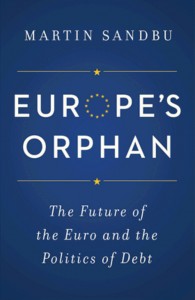
Blame the wrong policies not the Euro for the financial crisis

Martin Sandbu’s Europe’s Orphan makes you think again, an indepth analysis of the Eurozone crisis as he argues that the system is right plagued with wrong policies. Sandbu traces European Monetary Union back to the desire for greater European unity after the Second World War, and the euro’s creation coincided with a credit bubble that government chose not to restrict, and lead Europe’s political paralysis and economic stagnation.
The Eurozone sovereign debt crisis in 2010, has got nothing to do with the alleged design failures of the European Monetary Union.
The eurozone’s self-inflicted financial calamities and economic decline are a result of toxic cocktail of unforced policy errors by bankers, politicians and bureaucrats and coziness between finance and governments and extreme unwillingness to restructure the debts, as the banks should not have lend the money in the first place.
Martin Sandbu an economics commentator at the Financial Times explains the bad macroeconomic policies pursued by member states which were wholly avoidable, with the European Commission, European Central Bank and German and French handling of the Greece crisis, towards the debt restructuring.
Excessive fiscal austerity and monetary tightening combined with wrong policies and the failure to write down debts and the validation of ability to repay and finance the debts in a timely manner. If you are behind the mortgage repayment the banks will repossess your property, but if a country within European Union is behind the repayment what can European banks do? This wrong policies created Europe wide recession in 2011-2012 and liquidated thousands of businesses, made millions unemployed, and increased the debt burdens.
Sandbu reminds us it is not the Euro but the bad policies are responsible for the crisis, and there is no need for any deep institutional changes to sustain the Euro in the long run, and there is no need for fiscal or political union. What is needed is better macroeconomic policies and management and can be effectively achieved by returning the fiscal policies to national governments. These national governments should be unshackled from rules of 2012 fiscal compact.
The widespread fiscal austerity imposed on Eurozone countries in fact accelerated the financial crisis more intense and made way for double dip recession. The intrusive interventions by European Economic Banks and European Commission in Fiscal programs imposed on the debtor countries have been dictatorial undermining the legitimacy of the monetary union. The deflationary demand policies applied to many Eurozone countries created a stagnation from 2008.
The absence of mutualisation of Eurozone debts which creates greater risk-sharing and the non willingness of European Central Bank to step in at times of crisis.
Europe’s Orphan is must read book for everyone as it is invigorating and critical book and make us rethink and come up with new insights and solutions. Sandu also charts what must be done to achieve an economic and political recovery.
In his final chapter, he reminds us what the single currency was for.
The book also cogently explains why scapegoating the euro for Europe’s economic and political disunity is nonsense.
Martin Sandbu is the economics leader writer for the Financial Times and was a senior research fellow at the Zicklin centre for Business Ethics Research at the Wharton School, University of Pennsylvania and postdoctoral research fellow at the Earth Institute, Columbia University.
Europe’s Orphan: The future of the Euro and the Politics of Debt by Martin Sandbu.
Princeton University Press £19.95/ $29.95
336 pages

